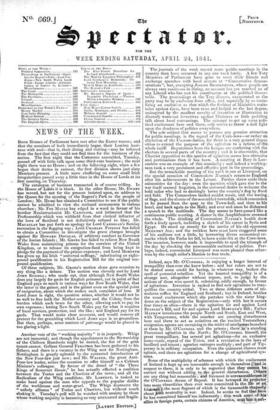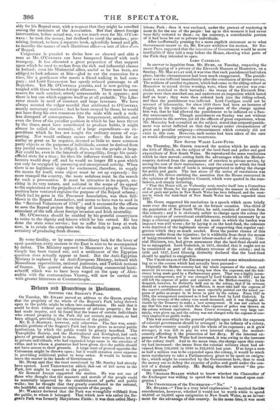Ireland, says Mr. O'CoNNELL, is enjoying a longer interval of
tranquillity than ever she knew before: and her rulers are not to be denied some credit for having, in whatever way, broken the
spell of perennial rebellion. Yet the boasted tranquillity is of a strange sort, altogether without repose, and, to judge by the actions of those who assert it, subsisting, oddly enough, by favour
of agitations. Invention is racked to find new agitations to tran- quillize the country withal. Two or three different sorts of sti- mulants suffice for England and Scotland ; but in Ireland, besides the usual excitement which she partakes with the sister king- doms on the subject of the Registration—only with her it occurs four times as often—there is the agitation for and against Lord STANLEY'S Bill, and for and against Lord MORPETH'S Bill ; Father MATHEW intoxicates the people North and South, East and West, with Temperance, while the unsober are creating disturbances here and there to act as sedatives on the 'excited Teetotallers;
emigration-agents are recruiting in the midst of anathemas launched at them by Mr. O'CONNELL and the priests ; there-411;a standing
Protestant agitation in the North ; Mr. O'CoNNELL himself, the great tranquillizer, has several pet agitations—for an exclusive home-trade, repeal of the Union, and a revolution in the laws of landlord and tenant ; agrarian outrages multiply; and part of Tip- perary is in military occupation. Even the quiescent classes must agitate, and there are agitations for a change of agricultural sys- tems.
Some of the multiplicity of schemes with which the excitement of Ireland is kept up are reasonable enough in themselves faiadavir respect to them, it is only to be regretted that they cam 4. carried out without adding_t2, the general disturbance. OtbIs, are any thing but reasonable ; and foremost in unreasonablemsoisir the O'CoNEELL dream of Repeal. It has betrayed its projector:4 into more absurdities than ever were committed in the life of an Irishunkuthe most flagrant of which is the treasonable rhapsody 742 about neutrality in war. Indeed, he seems to feel that;bere he has 'committed himself too indiscreetly : this week souse of his allies in foreign parts, certain citizens of America, senk him a,sub7 sidy for his Repeal rent, with a request that they might be enrolled among the members of the Association. But that direct foreign intervention, before actual war, was too much even for Mr. O'CON- NELL : he took the money, but declined to enrol the senders ; pro- mising, instead, to have a separate book, splendidly bound and gilt, to inscribe the names of such illustrious allies—a sort of libro d'oro of Repeal.
Conjecture is puzzled to divine how so shrewd and able a man as Mr. O'CONNELL can have hampered himself with such trumpery. It has alienated a great proportion of that support upon which he used to reckon from the rich and influential classes in Ireland : even his Ministerial allies, useful as he has been, are obliged to look askance at him—glad to cut the connexion for a time, like a gentleman who meets a friend walking in bad com- pany; and Lord ESSINGTON has openly refused patronage to all Repealers. Yet Mr. O'CONNELL persists, and is now getting en- tangled with these bootless foreign alliances. There must be some reason for such conduct, utterly unreasonable as it appears ; and there is but one which suggests itself as at all probable. The Libe- rator stands in need of constant and large revenues. We have always scouted the vulgar scandal that attributed to O'CONNELL merely mercenary motives : had he been swayed by those, he would not have flung his own resources into the scale with such a reck- less disregard of consequences. But temperament, ambition, and even the force of the peculiar position in which he has been thrust by the times, must have contributed to produce habits, it might- almost be called the necessity, of a large expenditure—an ex- penditure which he has not sought the ordinary means of sup- porting. Nor would ordinary means suffice : the funds for an outlay so great as he requires, devoted so little to mere common party objects or the purposes of individuals, cannot be derived from any partial sources : he is obliged, then, to tax the people at large. Nor could he, even in the intervals of tranquillity, forego his quasi- official state for a time ; for then his influence would wane, his ad- herents would drop off, and he would no longer till a post which can only be occupied by unceasing and unsurpassed activity. When there is no legitimate object for excitement, therefore, to supply the means for itself, some object must be set up expressly : the more tranquil the country, the more sedulous must be the search for such a provocative. It must be attractive in its aspect, ex- citing in its very nature, and national in the scope of its appeal to the aspirations or the prejudices of an untutored people. The sup- position here ventured explains the purpose of the Repeal scheme ; which bad its germ in the Precursor Association, was then full- blown in the Repeal Association, and seems to have run to seed in the "Revived Volunteers of 1782"; and it accounts for the efforts to save the Repeal project from dying of inanition, by the coarse stimulant of the talk about foreign invasion and Irish neutrality. Mr. O'CONNELL should be enabled by his grateful countrymen to retire to the dignity and leisure which he has earned. He has done the state some service ; but to suffer him to keep at work now, is to retain the eataplasm when the malady is gone, with the certainty of producing fresh disease.



























